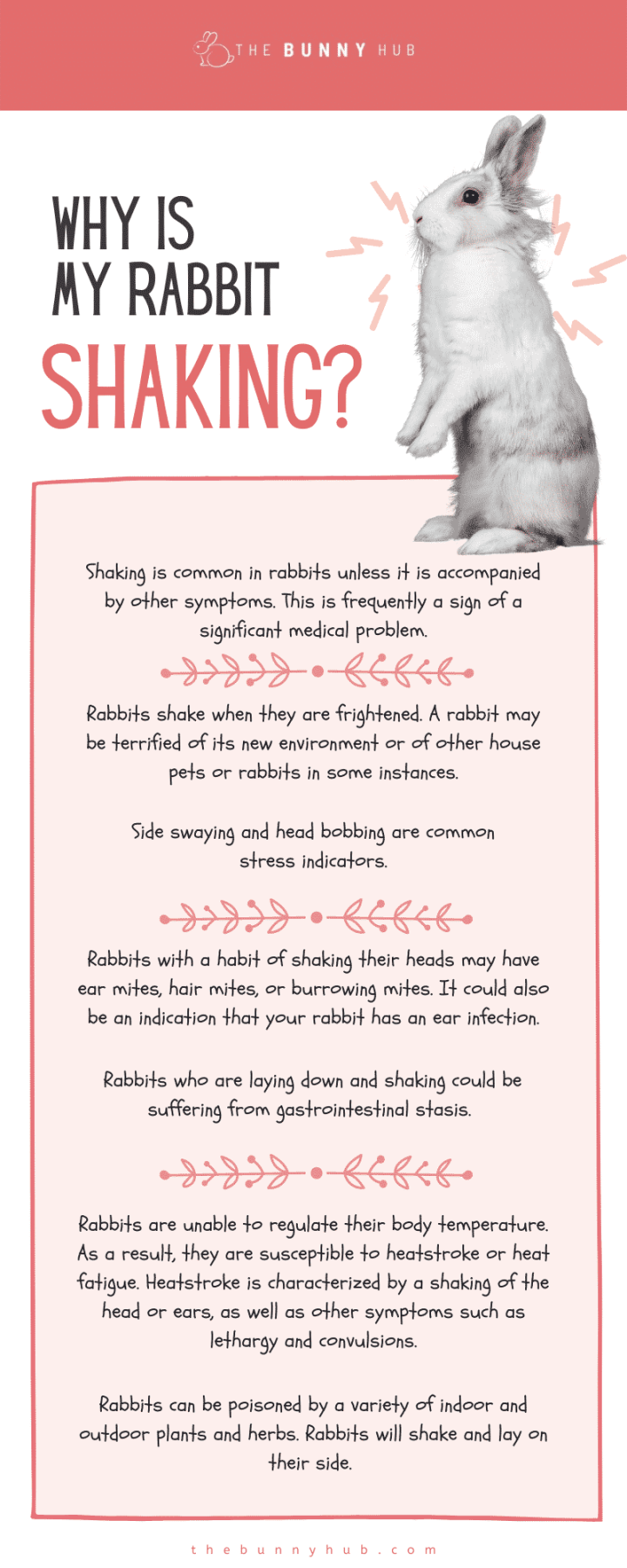Why is My Rabbit Shaking And Laying Down?
As a concerned rabbit owner, you might be worried if you notice your rabbit shaking and laying down. Rabbits are generally active and energetic animals, so any unusual behavior can be a cause for concern. In this article, we will explore some of the common reasons why rabbits shake and lay down, and what you can do to help them.

1. Cold or Chilling
Rabbits are sensitive to temperature changes, and if they are exposed to cold conditions, they may start shaking and laying down to conserve heat. If your rabbit is shaking and seems lethargic, it is essential to check the ambient temperature in their environment. Make sure their living space is warm enough, especially during colder months or if they are kept outdoors. Provide them with appropriate bedding and shelter to keep them cozy and protected from the cold.
2. Stress or Fear
Stress and fear can also cause rabbits to shake and lay down. Rabbits are prey animals, and they can become easily frightened or stressed in new or unfamiliar situations. Loud noises, sudden movements, or the presence of predators or other pets can all trigger anxiety in rabbits. If your rabbit is shaking and hiding or laying down, try to identify the source of stress and remove it from their environment. Provide a safe and quiet space for them to relax and feel secure.
3. Pain or Illness
Rabbits may shake and lay down if they are experiencing pain or illness. It can be challenging to determine the cause of their discomfort as rabbits are known to hide their symptoms. However, if your rabbit is shaking, refusing to eat or drink, or showing other signs of distress, it is crucial to seek veterinary attention. Common health issues that can cause shaking and lethargy in rabbits include dental problems, gastrointestinal issues, and infections. A thorough examination by a veterinarian will help diagnose and treat any underlying medical conditions.
4. Weakness or Fatigue
If your rabbit is shaking and laying down, it could be a sign of weakness or fatigue. This can occur due to inadequate nutrition, dehydration, or overexertion. Ensure that your rabbit is receiving a balanced diet that includes fresh hay, vegetables, and a limited amount of pellets. Provide clean water at all times to prevent dehydration. If your rabbit has been overly active or has not had enough rest, it may need a quiet and comfortable space to recover and regain its strength.
How to Help a Shaking And Laying Down Rabbit
If your rabbit is shaking and laying down, here are some steps you can take to help them:
- Assess the temperature: Make sure your rabbit’s environment is warm enough to prevent chilling.
- Create a safe and quiet space: Remove any potential stressors from their surroundings and provide a calm and secure area for them to relax.
- Monitor their behavior: Keep a close eye on your rabbit’s behavior and look for any other concerning signs or symptoms.
- Seek veterinary attention: If your rabbit’s shaking persists or is accompanied by other worrying symptoms, consult a veterinarian for a thorough examination and appropriate treatment.
- Ensure proper nutrition and hydration: Make sure your rabbit’s diet is well-balanced and provides all the necessary nutrients. Provide fresh water at all times to prevent dehydration.
- Allow adequate rest and recovery: If your rabbit has been overly active or appears fatigued, provide them with a quiet and comfortable space to rest and regain their strength.
It is crucial to observe your rabbit’s behavior and seek veterinary attention if you notice any concerning signs or symptoms.
Frequently Asked Questions (FAQs)
1. Can stress cause my rabbit to shake and lie down?
Yes, stress can cause rabbits to shake and exhibit unusual behavior, including laying down. Rabbits are sensitive animals, and they can become frightened or anxious in stressful situations. Creating a calm and secure environment for your rabbit can help alleviate stress-related symptoms.
2. Is it normal for rabbits to shake when they are cold?
Rabbits are more susceptible to colder temperatures as they cannot regulate their body temperature as effectively as humans. Shivering is their natural response to generate heat and keep warm. Providing appropriate warmth and shelter for your rabbit can help prevent them from shaking due to cold.
3. What should I do if my rabbit is shaking and refusing to eat or drink?
If your rabbit is displaying these symptoms, it is essential to seek veterinary attention promptly. Loss of appetite and dehydration can indicate a potentially serious underlying health issue. A veterinarian will be able to diagnose the problem and recommend appropriate treatment.
4. How can I prevent my rabbit from getting overexerted?
To prevent overexertion in rabbits, ensure they have a suitable and spacious living area where they can exercise freely. Avoid sudden, strenuous activities and allow your rabbit to rest when needed. Providing a balanced diet and plenty of fresh water will also contribute to their overall health and energy levels.
Related Articles…
Copyright Notice:
All images featured on this site are sourced from the internet, copyrights belong to respective owners. Should you own any image and require it to be removed, please contact us.